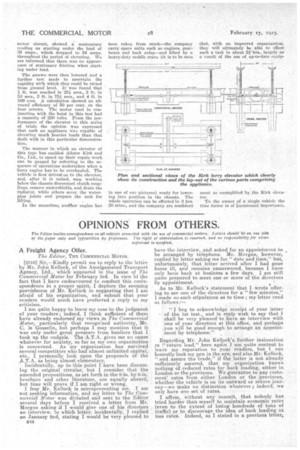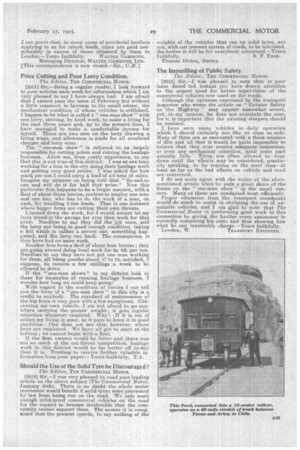OPINIONS FROM OTHERS.
Page 28

Page 29

If you've noticed an error in this article please click here to report it so we can fix it.
The Editor invites correspondence on all subjects conmccted with the use of commercial motors. LetterS should be on One Sidd of the paper only and typewritten by preference. The right of abbreviation. is reserved, and no responsibility for views expressed is accepted.
A Freight Agency Offer.
The Editor, TEE COMMERCIAL MOTOR.
[2310] Sir,—Kindly permit me to reply to the letter by Mr. John Kelloek, of the Amalgamated Transport Agency, Ltd. which .appeared the issue of The Commercial. Ltd., for February 3rd. In view of the
fact that I have endeavoured to conduct this correspondence in a proper spirit, I deplore the seeming peevishness of Mr. Kellock in suggesting that I am afraid of his organization, and submit that your readers would much have preferred a reply to my criticism.
I aim quite happy to leave my case to the judgment of your readers ; indeed, I think sufficient of them have already endorsed my'views in The Commercial Motor,particularly that recognized authority, Mr. C. le Gosselin, but perhaps I may mention that it was only under great pressure from hauliers that I took up the cudgels. The A.T.A. gives me no cause whatever for anxiety, so far as my own organization is concerned. As my organization has survived several competitors who had almost unlimited capital, etc., I personally look upon the proposals Of the A.T.A. as being almost elementary.
Incidentally, up to this point I have been discussing the original circular, but I consider that the amended propositions, as set forth in the 9-in. by 0-in. brochure and other literature, are equally absurd, but time will prove if I am right or wrong.
I fearMr. Kellockis misrepresenting me. I am not seeking information, and nrY letter to The Comriereial Motor was dictated and sent to the Editor several days before I received, a letter from Mr. Morgan asking if I would .give one of his directors an interview, to which letter; incidentally, I replied on January 2nd, stating I would be very Pleased to
1344 have the interview, and .asked for an appointment to be arranged by telephone. Mr. Morgan, however, replied by letter asking me-for " date and time," but, unfortunately, that letter arrived after I had gone home ill, and remains unanswered, because I have only been hack at business a few days. I am still quite prepared to meet one or more of the directors by appointment.
As to Mr. Kelloek's statement that I wrote*offering to see one of the directors for a "few minutes,'' I made no sueh stipulation as to time ; my letter read as follows :— " I beg to acknowledge recbipt of your letter of the lst inst., and in reply wish to say that I shall be very pleased-to have all interview with one of your directors at this office, and perhaps you will be good enough to arrange an appointment by telephone."
Regarding Mr. John Kellock's further insinuation re "return load," here again I am quite eontent to leave my reputation to your readers, but L can honestly look my pen in the eye, and also Mr. Kellock,' and assure the trade," if the latter is not already sufficiently assured, that my organization knows nothing of reduced rates for back loading, either in London or the provinces. We guarantee to pay customers' rates from either London or the provinces, whether the vehicle is on its outward or return journey—we make no distinction whatever ; indeed; we only have one set of rates.
I affirm, without any conceit, that nobody has tried harder than myself to maintain economic rates (even to the extent, of losing hundreds of tons of :traffic) or to discourage the idea of -back loading at less rates. Indeed,. as I stated in a previous letter, I can prove that, in many cases of provincial hauliers applying to us for return loads, rates are paid considerably in excess of those obtained by them to London—Yours faithfully, WALTLR GAMMONS, Managing Director; WALTER GAMMONS, LTD. [This correspondence is now closed.—Ea., C.M.]
Price Cutting and Poor Lorry Condition.
The Editor, THE COMMERCIAL MOTOR.
[23111 Sir,—Being a regular reader, I look forward to your articles each week for information which I am very pleased to Say I have always had. I am afraid that I cannot pass the issue of February 3rd without a little comment in fairness to the small owner, the mechanical condition of whose vehicles is criticised. I happen to be what is called a " one-man show" with one lorry, striving, by hard work, to make a living for the past three years and, up to the present time, have managed to make a comfortable income for myself. There are two men on the lorry drawing a living wage, and allowance is made for all overhead charges and lorry wear. The " one-man show" is referred to as largely responsible for cutting prices and ruining the haulage business. Allow me, from costly experience, to say that this is not true of this district. I was at one time working for a firm in the city doing then haulage work and getting very good prices. I was asked for how much per ton I could carry a load of 4-5 tons 13 mi]es. Imagine my surprise on being told that " So-and-so can and will do it for half that price." Now this particular firm happens to be a larger concern,, with a fleet of about three lorries, content to employ one mail and one boy, who has to do the work of a man, on each, for handling 5-ton loads. That is one instance where bigger firms are cutting their own throats. turned down the work, for I would sooner let my lorry stand in the garage for ever than work for that price. Needless to say they did the job once, and' the lorry not being in good enough condition, taking a hill which is rather a severe one, something happened, and the lorry ran hack. The consequence is they have had no more work.
Another firm have a fleet of about four lorries ; they are going around doing local work for 2s. 6d. per ton. Needless to say they have not got one man working for them, all being youths about 17 to 18, satisfied, I suppose, to receive a few shillings a week to be allowed to drive.
If the "one-man shows" in my district look to these for examples of running haulage business, I wonder how long we could keep going! With regard to the condition of lorries I can tell you the lorry of a " one-man show" in this city is credit to anybody. The standard of maintenance of the big firms is very poor with a few exceptions. Ganeerning my -own vehicle, .I ain not afraid to go anywhere carrying the proper weight; it gets regular attention whenever required. Why? If it is out of action my living, is gone, so it pays to keep it in good condition. One does not see this, however, where boys are employed. We have all got to start at the bottom ; we cannot begin with a fleet.
If the fleet owners would be fairer and there was not so much of the cut-throat competition) haulage work in this district would be far better off to-day than it is. Trustingto receive further valuable information from your paper.—Yours faithfully, T.A.
Should the Use of the Solid Tyre be Discouraged? The Editor, THE COMMERCIAL MOTOR.
[23121 Sir,—I was very pleased to read your leading article on the above subject (The Commercial Motor, January 20th). There is no doubt the whole motor movement would benefit if solid tyres were prevented by law from being run on the road. We only want enough nehd-tyred commercial vehicles on the road for the repairs to become intolerable that the community cannot support them. The sooner it is recognized that the present speeds, to say nothing of the
weights of the vehicles that run on solid tyres, are not, with our present system of roads, to be tolerated, thoU better it will be for everybody concerned.--Yours faithfully, S. F. EDGE. Thames Ditton, Surrey.
The Imperilling of Public Safety.
The Editor, THE COMMERCIAL MOTOR.
[2313] Sir,—I was pleased to note that in your issue dated 3rd instant you have drawn attention to the urgent need for better supervisionof the commercial vehicles now used on the roads.
Althoughthe opinions expressed by the transport inspector who wrote the article on " Greater Safety on the Highway" may appear somewhat severe, yet, in my opinion, he does not overstate the case, for it is important that the existing dangers should be realized.
I have seen many vehicles in daily operation which I should certainly not like to class as safe. Many of them are so encrusted with a thick mixture of dirt and oil that it would be quite impossible to believe that they, ever receive adequate inspection, or even any mechanical attention, until some part actually fails. Tyres are often allowed to wear down until the wheels may be considered, praetically speaking, to be running on the steel rims—at least so far as the bad effects on vehicle and road are concerned.
I do not quite agree with the writer of the aforementioned article when he puts a great share of the blame on the " one-man show" or the small concern. Many of these are conducted most efficiently.
Proper education from the transport standpoint would do much to assist in obviating the use of unsuitable vehicles, and I am glad to note that The Commercial Motor is performing good work in this connection by giving the haulier every assistance in correctly computing his costs and thus showing him what he can reasonably charge.—Yours faithfully,
London, W. TRANSPORT ENGINEER.
































